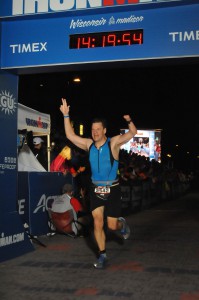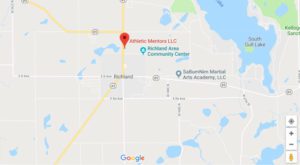 Joe Cekola credits his trials in life for his unstoppable performance in the face of adversity. The 52-year-old transformed from a casual runner into a competitive ‘Ironman’ despite what some would call a lifelong handicap and a broken clavicle from a crash just eight weeks prior to Ironman Wisconscin.
Joe Cekola credits his trials in life for his unstoppable performance in the face of adversity. The 52-year-old transformed from a casual runner into a competitive ‘Ironman’ despite what some would call a lifelong handicap and a broken clavicle from a crash just eight weeks prior to Ironman Wisconscin.
Joe learned the importance of his father’s advice the hard way. At 7 years old, he lost his left hand grinding sausage at a family pizza joint. His dad told him to use the safety plunger, but in his youthful impatience, Joe decided he didn’t need any safety equipment.
While some would call it a handicap, having one hand is simply a shadow in Joe’s life. It’s not an obstacle, it just is. His mishap shaped his life attitude and instilled a do-it-all drive that might not be present if it weren’t for his childhood disobedience.
Joe credits his grandfather, who lost his arm in a factory, for influencing his positive outlook growing up. Because he had experienced something similar to Joe’s injury, he paid special attention to him and often shared his favorite line: “If they can do it, you can do it better. Don’t ever forget that.” Joe relentlessly followed his grandfather’s strong will.
“I’ve never forgotten that,” said Joe. “There’s been nothing that I can’t do. He made me do everything—I wasn’t given an option!”
He played basketball and football as a child and baseball in high school. In his young adulthood, he played in a recreation soccer league. Joe has tried most sports, but the one he hadn’t done much of was running.
Today, Joe has completed 11 marathons, an ultra, 2 triathlons, a half Ironman and an Ironman. You’d think he’d been training for years. In reality, Joe began his running journey a mere 5 years ago. He never ran seriously before 2009, but Joe had a short 3.2 mile race on his bucket list. With a little help from his friends, he completed the Borgess 5K run in his hometown, Kalamazoo. He continued to run with his training partners, and without much notice, his enjoyment of running began to grow. He progressed his running strength to marathon status and then ultra marathons until he realized that maybe he was putting too many miles on his feet.
“I was getting hurt running, so I bought a bike 1.5 years ago and decided to sign up for a small triathlon, just to see how I would do,” Joe said.
He found out he wasn’t a very good swimmer, but he enjoyed the biking aspect enough to keep training. Shortly after, he watched a friend do an Ironman in Wisconsin. Watching thousands of athletes attempt such a prestigious physical feat inspired him in a strange, oxymoronic way. The thought of completing an Ironman was intimidating yet exhilarating; Joe recollected his thoughts after committing to the idea and laughed, “I don’t even know what I’m doing, I don’t even know how to swim!”
After a near last place finish at his first triathlon and a competitive drive to get better and work toward that Ironman, he decided to join the Athletic Mentors team for a more professional training regimen.
Training at Athletic Mentors has helped Joe progress immensely, especially in the water. Swim coach Tom Belco doesn’t consider Joe’s missing hand a disadvantage. He expects Joe to train just as hard as everyone else, and serves as good mental and physical inspiration. With time, Joe penciled in a half Ironman 12 weeks before the big event: a full Ironman in Wisconsin on September 7, 2014, the same race his friend was in that inspired him.
At the Half Ironman, he was feeling great after his best swim time. But 8 miles out from the finish of the bike leg, he crashed and broke his collarbone (the same side as his missing hand, “thank God!”).
The support group at Athletic Mentors encouraged him to keep training. Between his coaches, his friends and his training partners, he pushed through the mental and physical setbacks.
“I was hesitant and thought I couldn’t do it, but they had confidence that I could come back,” said Joe.
 Flash forward through eight weeks of training with a sling on the elliptical and in the pool, and four weeks of adjusting back to normal function. Joe was completing his first Ironman in personal record time.
Flash forward through eight weeks of training with a sling on the elliptical and in the pool, and four weeks of adjusting back to normal function. Joe was completing his first Ironman in personal record time.
Joe beat over 1,000 athletes, placing 1,636th out of 2,826. The experience was unlike anything that preceded it; 75,000 cheering fans lined the course and he had a support group of over 20 friends and family members. He swam his best time at that distance (1:39:58), had a good bike time despite the hills (7:05:59) and ran the full marathon (5:14:10) for a total time of 14:19:56.
The deep feeling of happiness and contentment is one of the greatest drives that motivates athletes like Joe. That, coupled with the strong friendships he’s developed from training, is what keeps him going. For others, Joe offers simple advice on achieving goals both big and small, the same principles he raised his three children with.
“Life is going to throw you some curve balls—accidents, crashes or losses—but never give up,” said Joe. “Just keep trekking forward one step at a time, and you can make whatever goal you want.”
Post Ironman, Joe is slowing down his training and taking a bit of recovery time. His goals for the future are unknown; he is simply reveling in accomplishing the goal he set for himself last year. “I haven’t another target yet, but I’m sure I will soon,” he said.
For now, he will join his friends in “shenanigans” and perhaps enjoy a few more beers than usual, awaiting to defeat the next challenge that is thrown his way.
 Athletic Mentors
Athletic Mentors